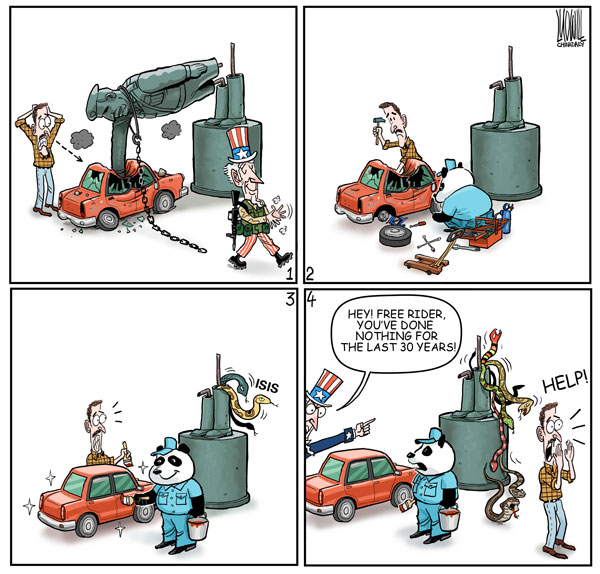Is China really a free rider in the Middle East?
- By Jin Liangxiang
 0 Comment(s)
0 Comment(s) Print
Print E-mail China.org.cn, August 25, 2014
E-mail China.org.cn, August 25, 2014
|
|
|
[By Luo Jie/China Daily] |
With the rise of the recent tensions in the Middle East, in particular the emergence of ISIS in Iraq, China’s role in the region was again brought into focus. On August 8, 2014, in an interview with New York Times columnist Thomas Friedman, Barack Obama claimed that China had been a free rider for thirty years, and that no one expected China to play the role.
Actually this is not a new point of view. Paul Haenle, Director of Carnegie-Tsinghua Center for Global Policy, wrote in the Financial Times on October 8, 2013, that “China’s rise to global leadership means rhetoric and vetoes are no longer enough”. He meant that China should side with the US.
An article “Middle East Oil Fuels Fresh China-U.S. Tensions” in Wall Street Journal two days later claimed that China and other oil-consuming nations have benefited as Washington spent billions of dollars a year to police chokepoints like the Strait of Hormuz and other volatile parts of the Middle East to ensure oil flow around the globe.
Though these arguments have some traction in the international community, they are actually based on series of false assumptions on the roles of China and the US. And China’s image as a “free rider” in the Middle East is a result of fabrication.
This argument is firstly based on the false assumption that the US had been a provider of global security in the last decade, which is questionable in itself. It might be true that the US played a positive role in the Middle East in the 1990s. The US led multinational forces to drive Saddam Hussein from Kuwait back to Iraq; the US tried to make efforts to promote peace process between Israel and Palestine.
But unfortunately, the US was rather a provider of insecurity in the decade since 2001 when George Bush was in the White House. With the two wars in Afghanistan and Iraq, the US not only destroyed the domestic order of the two countries, but also further undermined regional security and stability, as indicated by the domestic tensions in Iraq and Afghanistan, as well as regional conflicts. The resurgence of the Taliban in Afghanistan and the emergence of ISIL in Iraq are outcomes of the two wars.
Being prudent in the use of military force might prove to be the right lesson that Barack Obama learned from his predecessor. But that does not mean the Obama’s administration should not be responsible for regional turmoil. Shortly after taking office, Obama decided to withdraw forces from Iraq. It is wrong to intervene in Iraq’s internal issues by military means, but it is equally irresponsible to withdraw forces from Iraq when Iraq’s security forces are far from being prepared. How can the US just leave the mess behind? It is the same with Afghanistan.
Though President Obama has sufficiently demonstrated his reluctance in intervening in Syria’s domestic affairs, he is strongly “committed to stand on the right side of history”, which greatly fueled Syria’s domestic tensions. And it is just by taking advantage of Syria’s civil war that ISIS has been able to increase its strengths.







Go to Forum >>0 Comment(s)